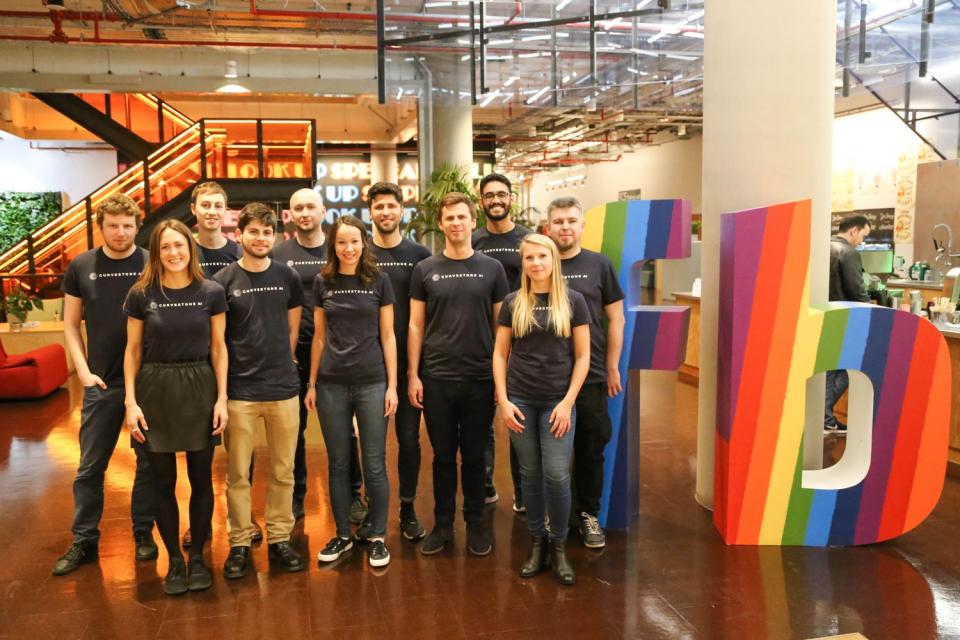On-Demand: How WhatsApp-style tutoring is helping disadvantaged children with maths GCSE homework
In 2010, the Sutton Trust Mobility Manifesto said around 60 per cent of pupils who receive free school meals do not pass their maths and English GCSEs.
Passing the Maths GCSE is particularly important for continuing on to further education and getting a job. As then-skills minister Matt Hancock said back in 2013: “For lots of employers if you don’t have a C in English and maths you don’t get that foot in the door.”
This is what Curvestone wants to solve with its latest project, On-Demand, in partnership with Tutorfair. The AI-focused start-up has created a WhatsApp-style app that connects underprivileged students with tutors to help them with their maths GCSE queries.
Though in a pilot stage, the idea is that pupils will gain access to help they otherwise couldn't afford, and provide a means of social mobility.
Here’s how it works.
On-Demand: WhatsApp-style maths tutoring
Curvestone and Tutorfair received a £150,000 grant from Nesta to launch its On-Demand service. It’s currently running a pilot programme with 36 schools in London, which have over 50 per cent of students receiving free school meals, a known indicator of families living in poverty.
The organisation goes into schools and trains up the teachers and students on how to use the platform. It is live during homework hours, 6-9pm during the evenings and at the weekends. Students take a picture of the question they're struggling with and post it on the app, and then a tutor will respond.

The volunteer tutors are supplied by Tutorfair, another ed-tech start-up which two of Curvestone’s co-founders, CTO Sebastian Kotur and CDO Breanna Yen, previously worked at.
“Disadvantaged children don’t feel entitled or sometimes don’t know how to ask for help,” CEO and co-founder Dawid Kotur tells the Standard. “If you go home where maybe there isn’t a full family there or the family works shifts, the last thing they think about is to ask for help.
“The cool thing is that they don’t need to know how to ask for help. All they have to do is take a photo and the tutor will figure out what help they need.”
What benefit will On-Demand bring?
The recent pilot launched in October 2017 but Curvestone will have to wait until August when the 2019-2020 GCSE results come out to see if the platform is making a difference. So far, the organisation is seeing some notable statistics in its own measurements.
Around 70 per cent of users are female, and when Curvestone on-boards a school, around 20 to 30 per cent of pupils become active users.
As well, Curvestone is able to extract data from pupils' queries and feed it back to the schools. “If we’re getting most of a class logging in and asking about recurring numbers, we feed that back to the teachers,” explains Yen.
“This is something the teachers ask for and then we can help them to understand how kids are getting what they are teaching,” adds Kotur.
Curvestone also wants to help the tutors, which is where the AI element of the organisation’s work comes in. The company is using machine learning to analyse the transcripts of conversations between tutors and students to assess a tutor’s performance. This information is fed back to the tutor to help them with their work.
“They find it really valuable,” says Yen. “Tutoring is quite a lonely industry and you don’t get much feedback because you’re usually only one-on-one with a student and they’re not really qualified to give it.”
It can also help Curvestone, and therefore its tutors, understand the best way to approach teaching. Already, the company is seeing a correlation between how tutors teach and the regularity of how often students come back. Given that all On-Demand’s tutors volunteer for the platform, Curvestone says this feedback is a way to pay them for their time.
“We want to provide really good training because that’s kind of our way to pay them back, so they can improve as they teach,” explains Kotur.
Using AI for good
To improve the On-Demand offering, Curvestone took part in Facebook’s recent LDN_LAB accelerator programme, which focused on start-ups using deep tech for good. Specifically, the organisation wanted to increase its number of active users and hoped to use Facebook’s expertise to do that, as well as improving its AI tech.
However, Kotur and Yen both say that one of the major benefits of the programme was access to mentors. They worked alongside a Facebook product manager, Tom Goldsmith, who has sold one ed-tech start-up in the past, as well as Guillaume Bouchard, who founded the AI start-up, Bloomsbury AI, Facebook acquired last year.
Their main mentor was Pancham Gajjar, a product marketing manager at Facebook, a former engineer.

“[Goldsmith] gave us so much practical advice on how to sell to schools,” says Yen.
“Those kind of little gold nuggets that usually take you months to figure out yourself,” adds Kotur.
LDN LAB officially wraps up this week, but Curvestone has plans to continue On-Demand. It’s waiting to see the results from this year’s pilot, and will hopefully use this to scale the app across the country to reach more schools.
“The Nesta grant is to help kids in coastal and rural areas, they don’t have access to great talent like tutors and teachers that we do here in the city,” explains Yen. “So this is just the pilot. As soon as we can prove that it is super useful, we’ll be able to expand it out.”

 Yahoo News
Yahoo News 